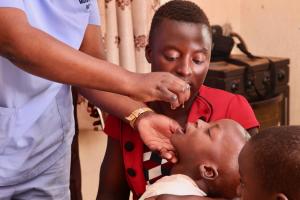Improving Immunization Services Provision in Zimbabwe Through Effective Vaccine Management
The quality of vaccines is critical for good immunization outcomes. Vaccine quality determines uptake, safety and effectiveness of vaccines. This ultimately influences capacity of health systems to reduce morbidity and mortality due to vaccine preventable diseases.
With rising cost of vaccines and the greater storage capacity now required at every level of the immunization supply chain, countries must maintain lower stock levels, reduce wastage, accurately forecast vaccine requirements, and prevent equipment break-downs. This requires a consistently high standard of supply chain management, which can only be achieved if all the links in the supply chain comply with current good storage and distribution practices. The Effective Vaccine Management (EVM) initiative provides the materials needed to monitor and assess vaccine supply chains and to help countries to improve their supply chain performance. The findings of the Effective Vaccine Management Assessment (EVMA) guides the development of comprehensive improvement plans to improve the vaccine supply chain.
The Ministry of Health and Child Care Zimbabwe, in collaboration with WHO and UNICEF conducted an EVMA period 18 January to 07 February 2020 as follow up to a similar assessment carried out in 2016. The objectives of the 2020 EVMA were to assess the quality and sufficiency of the vaccine supply chain in Zimbabwe and to develop a comprehensive improvement plan to dispense good quality vaccines and ensure compliance to WHO EVM standards. The assessment was conducted using the standard WHO 9 Criteria EVMA tool. Areas assessed included vaccine arrival procedures, temperature monitoring, vaccine storage, buildings, transport and equipment, stock management, management information systems and supportive functions. The assessment was carried out at 48 facilities comprising 1 Central Vaccine Stores, 8 provincial vaccine stores, 19 district vaccine stores and 20 service deliver facilities all randomly selected using the WHO site selection tool.
Data collection included carrying out key informant interviews with service providers and managers, inspection of records and observation of building and cold chain equipment to assess vaccine management practices. This was followed a data consolidation and cleaning process leading to data analysis and report writing.
The country attained a global score of 83% implying that the country had for the first time managed to meet the minimum WHO threshold of 80% for satisfactory vaccine management system and this was a notable improvement from the 79% achieved in 2016. This commendable achievement is attributed to several activities carried out as a follow up to the 2016 EVMA recommendations. The country had managed to procure and install remote temperature monitoring devices at national and provincial levels to monitor cold room temperatures. It had also procured and availed to storekeepers warm clothing for working in cold rooms. Standard operating procedures for EVM were developed, printed and issued out to all levels of the vaccine management. Trainings on effective vaccine management had been conducted at levels of the vaccine supply chain.
The study noted that all vaccines and supplies were received in good condition with adequate documentation including vaccine arrival reports (VAR). Temperature monitoring at all levels is being conducted as per WHO standards. Temperatures were checked twice daily, and the temperature records were available and were being reviewed monthly at all levels. Remote temperature monitoring devices were in use at central and provincial levels. However, 10 cold rooms and 1 freezer room at central vaccine store were not temperature mapped in the last 3 years. Temperature mapping is critical in establishing exact temperatures of all sections of the cold and freezer rooms to inform decisions on where to place vaccines in these rooms. On storage and transportation of vaccines, two districts were observed to be still using ice packs against the national cold chain management policy. Use of ice packs has been discouraged due to the high risk of freezing vaccines. On vaccine security, only 5 of the 8 provinces had fire extinguishers. In addition, fire extinguishers for the remaining three provinces were not serviced. Preventive maintenance plan for cold chain equipment was in place at central stores and there was evidence that the plan was being followed. However, none of the provinces, districts and health facilities had the preventive maintenance plans. Vaccines were correctly stored and First Expiry First Out (FEFO) was observed at all levels. All Provinces and districts were using computerized stock management system while standard stock record books for capturing basic information on vaccines and consumables were available at all health facilities. However, all the districts had no evidence of internal reviews of damaged vaccines to facilitate development of strategies to reduce this type of vaccine wastage. In addition, physical stock counts and stock records of vaccines and supplies were not matching in 12 of the 20 health facilities. On staff knowledge, it was noted that all vaccine stores staff had adequate knowledge on Multi Dose Vial Policy, Vaccine Vial Monitor and on calculation of wastage rates while only a third of them had adequate knowledge of the shake test. The shake test is used to determine if vaccines have been exposed to freezing or not.
In view of the findings, it was recommended that the National EPI office carry out temperature monitoring and mapping studies on the remaining cold and freezer rooms. All districts to use only coolant packs to avoid damaging vaccines through freezing. All provinces should procure fire extinguishers and service them appropriately to reduce risk of damaging vaccines through fires. All subnational levels should develop and implement Preventive Maintenance Plans for buildings and cold chain equipment. District and health facility vaccine store keepers should regularly conduct physical counts and reconcile stocks with electronic stock management system to ensure accuracy of stock records and avoid vaccine stock outs.



